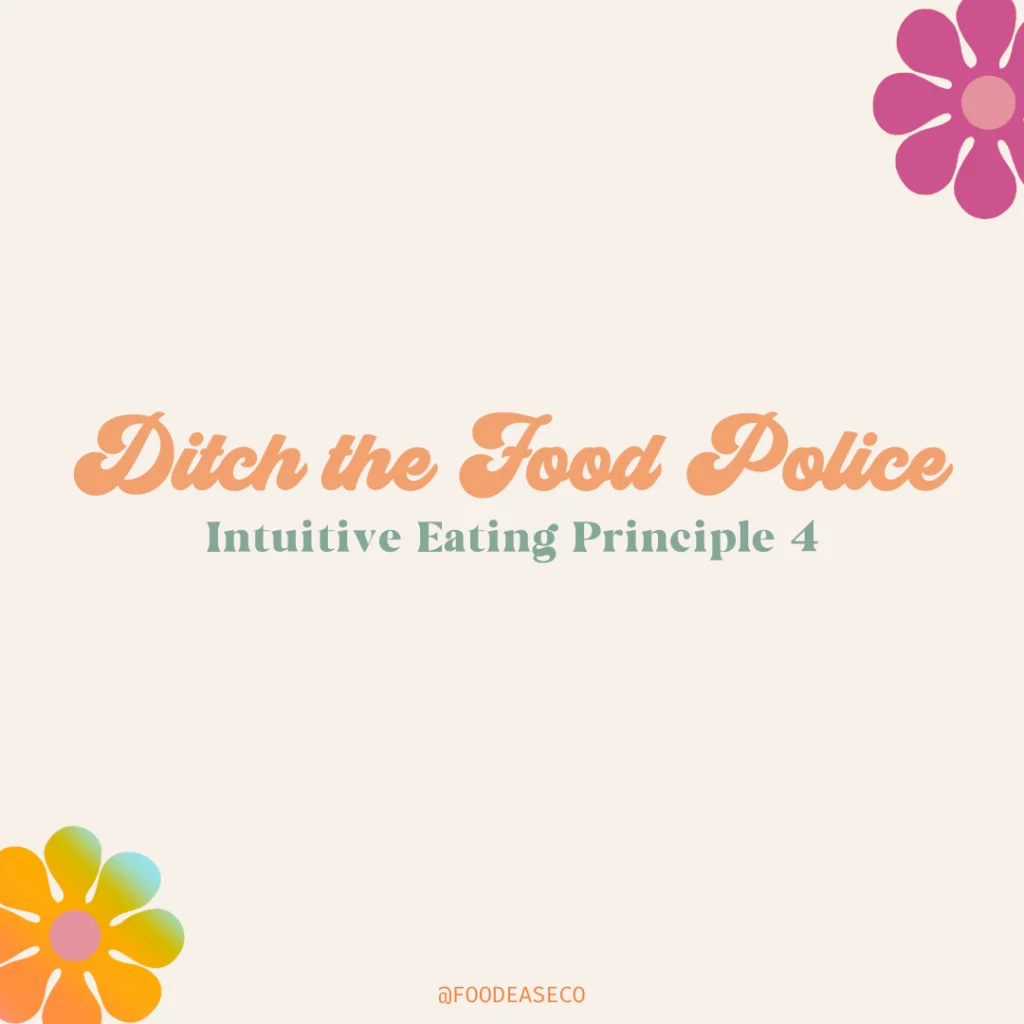Intuitive Eating part 4: Ditching the Food Police

Introduction
Picture this: you’re on a warm, sunny vacation and get an ice cream sundae after a long day at the beach. The rest of the night you can’t stop thinking how “bad” you are for having ice cream. Maybe the next day you compensate and only eat “good” foods like salads and ice water (Hey-diet culture says they’re “safe!”).
Thoughts like these around food is what we’re calling “the food police.”

What is the Food Police?
They’re the thoughts in your head, the beliefs and negative voices telling you when and how to eat. There is a lot of judgment in these voices.
The food police usually stems from diet culture. They’re tidbits we’ve picked up from different health “gurus,” advice friends have told us, or maybe something our mother used to say.
Over time it can be difficult to distinguish which food facts are true and which ones came from diet culture. But, attaching morality to food can be very problematic.
Diets Are A Lot Like Religion
Too often do we see friends or family members identifying by the way they eat. As if it is a part of who they are and reflects moral characteristics. The enthusiasm for their current eating pattern can seem like religious fervor, complete with moving and heartfelt conversion stories proselytizing attempts.
Does this sound familiar?
I remember when I was in my master’s program (for nutrition!!) and many students would often engage in this kind of conversation. At the time, plant-based veganism was the religion of choice.
Other examples of food talk could include:
· Sweets are bad for you
· I shouldn’t eat after 6pm.
· If I eat breakfast, I’ll just be hungrier throughout the day.
· I can’t be trusted around bread.
Even if you’re not currently dieting, you may have noticed your food police still very present. Food companies play into this construct and label use labels on their food products like:
· “Guilt-free”
· “Guiltless”
· “Zero guilt”
· “Guilty pleasure”
These terms are not used by accident. Food marketing is a tricky game and feeding into morality we have grown to place on food further perpetuates the food police and diet culture as whole.
I think we can all agree placing these kind of moral rules around our food is restrictive, exhausting, and miserable.
So, how do we ditch the food police for good?
1. Make observations without judgment. Thoughts like, “I exercised after skipping breakfast and was starving by 12pm” or, “I had ice cream last night, but didn’t pay enough attention to how they tasted” are free of judgment. Writing down how your feel before and after eating can help you keep track of these feelings. You may want to note your hunger and fullness levels (see more here), cravings, energy levels, body sensations, and any judgments you find coming up.
2. Disrupt the negative voice. Identify all of the food police’s irrational rules and challenge those thoughts! Banish any absolutes like “must,” “perfect,” “should,” “shouldn’t,” or “bad.” Replace these words with rational ones. For example, “I can eat whenever I’m hungry,” or “it’s OK to have dessert at lunch AND dinner.”
When the food police feel strong, sometimes mantras can help move us through. Try these:
· I honored my hunger many times this week.
· I am learning to trust myself with food.
· This is a process and I am doing great.
3. Utilize process thinking. Dieting is a linear way of thinking where any perceived failure and set you up for eating past fullness. Instead of focusing on the end results, shift your focus to the continual change and learning process. This inherently means you acknowledge there are ups and downs (Intuitive Eating is NOT a linear process), but overall progression forward. Focus on the small wins! They add up over time.
Wrap-up
Sometimes identifying the negative voice in your head can be challenging, but it gets easier with practice. When we start to tune in and effectively “hear” all of our food rules we’ve collected over the years, the easier we can identify and work on them. Work through this principle to let go of morality and judgment around food. It’ll make eating so much more fun, I promise!
For more on food police and challenging food rules, check out my post about making peace with food here.
Have a Question?


Do you have any questions or suggestions? Feel free to contact us! Just leave your email here, and we will get back to you shortly.
